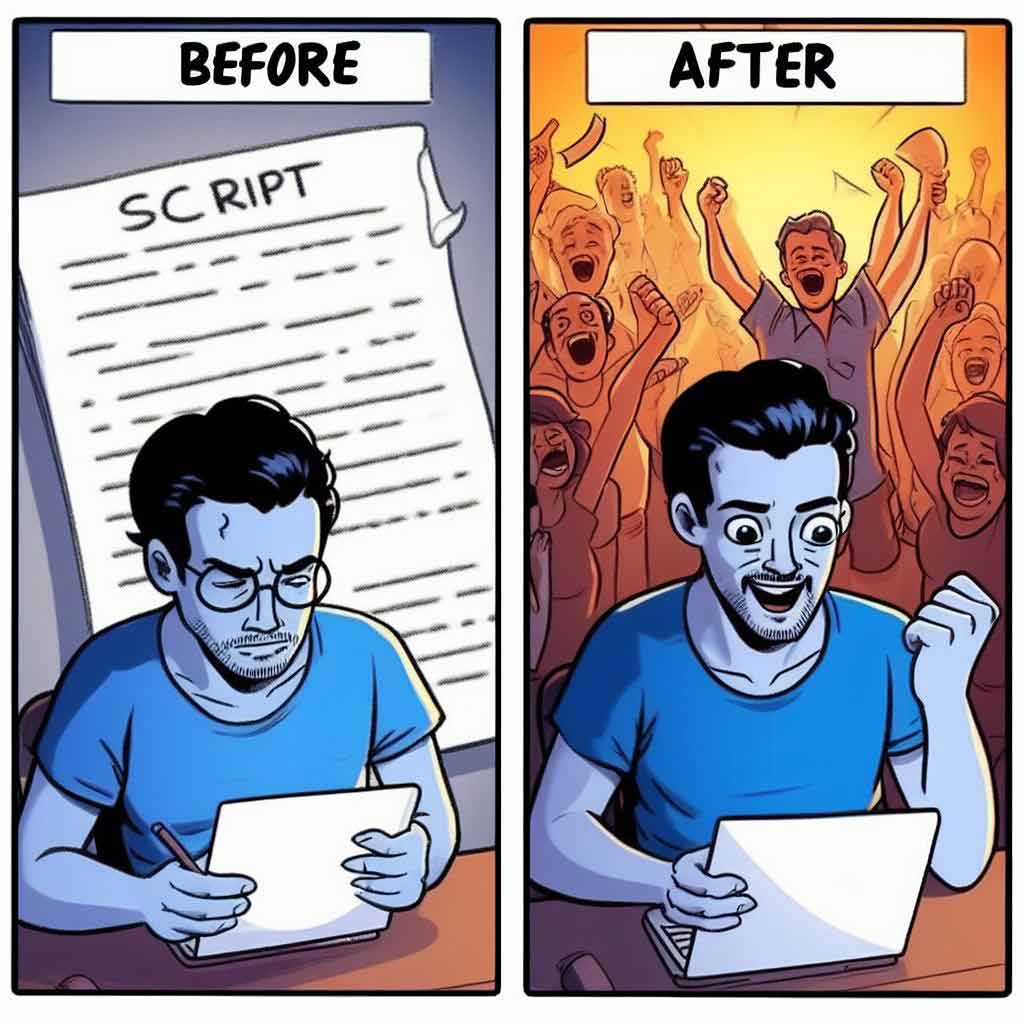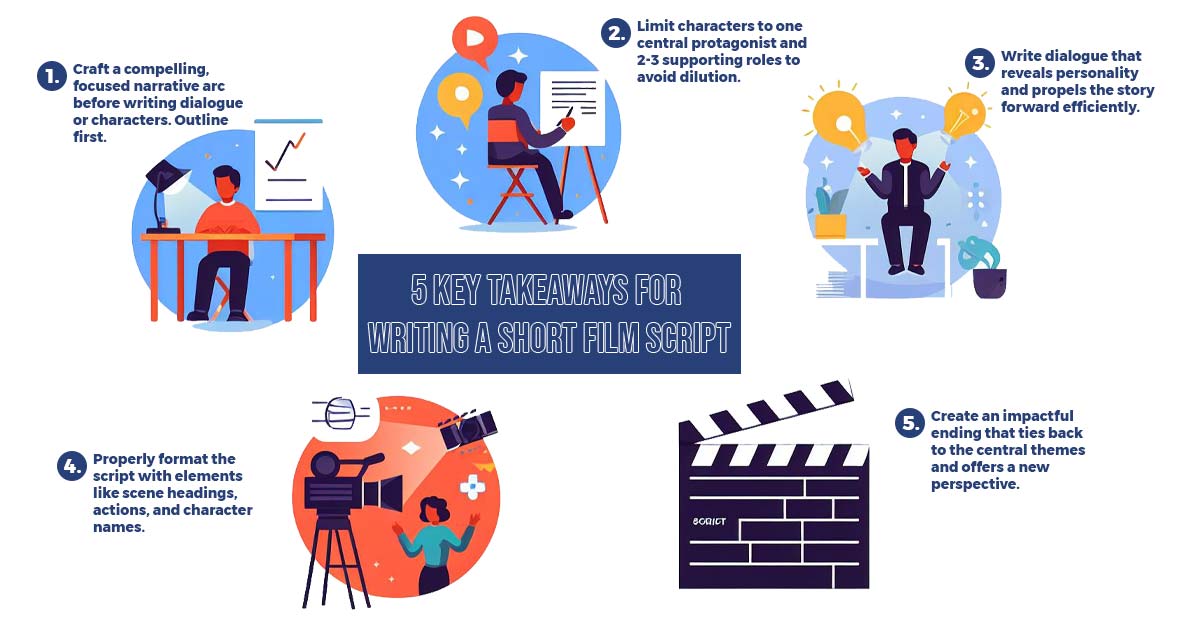Have a visionary idea for a short film that would blow audiences away? Eager to finally bring your storytelling talents to life on the screen? Whether you dream of screening at prestigious festivals, attracting Hollywood attention, or eventually winning an Oscar gold statuette for Best Short Film, it all starts with the script.
However, writing a compelling short film script that captivates viewers in a limited runtime comes with unique challenges for beginners. How do you craft a resonating narrative arc in just minutes? Where should you focus attention to maximize impact? What mistakes doom many first-time short scripts?
This comprehensive guide answers those questions and more, revealing the secrets of successful short film writing. You’ll learn how to develop memorable yet authentic characters, write riveting dialogue, format properly, and avoid narrative pitfalls – equipping you with the toolkit to write a stellar short script.
So if you have a brilliant idea waiting to bloom into a fully realized world, let’s get started. It’s time to master the art of short film screenwriting.
Introduction
Whether you’re an aspiring filmmaker hoping to bring your visionary idea to life or a screenwriter looking to flex your creative muscles, writing an impactful short film script is a key step on the path to cinematic success.
But with limited runtime, no room for meandering subplots, and the pressure to deliver a meaningful story arc, writing a short film can seem downright daunting for beginners. Where do you even start? How do you craft compelling characters? What story structure should you use?
This comprehensive guide will walk you through the entire short film writing process, from generating concept ideas to avoiding common mistakes. You’ll learn proven storytelling techniques to captivate viewers along with expert tips on formatting scripts properly.
Follow these steps and you’ll be ready to produce a stellar short film script that sets you up for festival acclaim, industry attention, and maybe even an Oscar one day. Time to transform that genius idea into reality!
How to Write a Short Film Script – Crafting A Captivating Story
At the core of every great short film is a phenomenal story. Unlike a feature-length film, you don’t have the luxury of sprawling subplots and huge casts of characters. Every single scene must advance the central narrative and develop the core themes.
Before you start writing, brainstorm compelling story ideas and determine the main narrative arc. Having a clear vision for the plot, protagonist journey, and ending will give your script direction and purpose. Here are some tips for crafting a killer short film story:
Define The Central Conflict
The central drama or conflict is the driving force that hooks an audience and holds their attention. Is your protagonist on a quest for revenge? Trying to rescue a loved one? Attempting to prove their worth?
The conflict should be clearly established early and connected to the resolution.
Focus On a Single Main Character
With a short runtime, you can’t afford to dilute things with an ensemble cast. Choose a single protagonist to root for and ensure every scene revolves around their desires, motivations, and personal journey.
Limit Locations & Characters
A common short film mistake is cramming too many characters, subplots, and locations into the script. This leads to a fragmented, confusing narrative. For maximum impact, keep locations under 5 and additional named characters under 3.

Craft an Impactful Ending
The ending is your chance to deliver a moment of truth that resonates with viewers long after the credits roll. Take time to brainstorm meaningful, compelling endings that tie back to the themes and offer a new perspective.
Know When to Leave Questions Unanswered
Unlike a feature, you don’t need to explain everything in a short film. Well-placed subtlety where audiences can read between the lines often enhances the experience.
Developing Dimensional, Relatable Characters
Even with limited screen time, you need to craft protagonists that feel like real people. Use quick techniques to hint at much greater depth beneath the surface.
Give Your Protagonist a Clear Goal
What is driving your protagonist? What is their sole focus, mission, or objective that propels the story? Giving your protagonist a clear goal gives purpose to their journey.
Provide Glimpses of Backstory
While you may never explain their full backstory, give glimpses through dialogue and props that suggest a larger life story and history. Maybe your character glancing wistfully at an old photo that sparks curiosity.
Show Their Personality Through Actions
Reveal your character’s personality through their behavior, decisions, and interactions. Are they reckless or cautious? Introverted or gregarious? Brilliant or naive? Show, don’t tell.
Make Their Dialogue Distinct
Well-crafted dialogue is an efficient way to convey backstory, personality, and relationships. Give your protagonist a unique voice and dialogue style.
Make Their Arc Impactful
In a short timeframe your protagonist still needs to go on a meaningful emotional arc or change in perspective. Avoid flat, one-note characters.
Writing Riveting Dialogue
Dialogue brings your characters to life and reveals relationship dynamics. When writing dialogue keep these principles in mind:
Make it Concise
Every line of dialogue must add value. Avoid small talk and get right to the point.
Reveal Personality
Dialogue is a shortcut into who a character is. Word choice, speech patterns and tone reveal personality.
Move the Story Forward
Every exchange should propel the story. Remove any dialogue that just circulates without purpose.
Use Subtext
By having characters avoid certain topics or pivot conversation, you can reveal subtext and hidden feelings.
Heighten the Tension
Dialogue during tense scenes should ratchet up the stakes and tension. Use shortened sentences and cutting language to increase pace.
Include Personal Touches
Idiosyncratic phrases characters repeat or unique nicknames they use for each other bring authenticity.
Formatting Your Short Film Script Properly
Formatting is important both for readability and being able to quickly gauge the length of your script. Use screenwriting software or stick to these common formatting guidelines:
- Use 12-point Courier font for easy reading.
- Only include actions essential to the story in the scene descriptions. Slim it down.
- Use all CAPS and center character names before dialogue.
- Employ lots of white space through brief paragraphs and dialogue exchanges.
- Add scene headings in ALL CAPS indicating the location and day/night.
- Use parentheticals sparingly to indicate essential action or tone.
- Insert page breaks when moving between scenes or major shifts in time/place.
Writing a Powerful Logline
A logline is a 1-2 sentence summary that captures the essence of your story and acts as a selling tool. Though brief, a strong logline contains:
- The protagonist/hero
- Their clear goal/objective
- The central conflict or obstacle in their way
- The key stakes involved
Here’s a logline example:
When a terminally ill teenager’s wish to meet her rock idol is thwarted, she breaks out of hospice care and sets off on a wild road trip to his final concert, pursued by her concerned doctor.
Short Film Title Ideas That Draw In Viewers
Brainstorm short, catchy titles that instantly convey the theme or offer intrigue. Here are some examples:
- After Hours
- The Audition
- Ready or Not
- The Rehearsal
- Last Day on Earth
- Anything Helps
- Assumptions
- Almost Missed It

Optimizing Script Length For Maximum Impact
A short film script generally should have:
- 3-15 pages for a 1-5 minute short
- 10-30 pages for a 5-15 minute short
- 30-45 pages for a 15-30 minute short
Anything in the 30-45 page range has the highest chance of being produced.
Aim to limit your script length based on your intended runtime. Every page equates to roughly one minute of screen time.
Mistakes to Avoid When Writing Your First Short Film Script
It’s all too easy for first-time short scriptwriters to derail their efforts. Steer clear of these common missteps:
- Forgetting to outline the narrative first before writing. Don’t “wing it”.
- Trying to stuff too much story instead of keeping the central conflict focused.
- Creating overly complex characters that can’t be developed sufficiently.
- Attempting to build too many locations, limits what you can produce.
- Having dialogue that waxes poetic for no reason and sounds unrealistic.
- Failing to format the script properly or include essential scene details.
- Writing an ending that comes abruptly without resolution of any kind.
Tips for Giving Your Script Extra Emotional Impact
While plot and structure are essential, it’s character and emotion that ultimately connect with viewers. Use these tips to make your script resonate:
- Include relatable character moments and reactions.
- Don’t shy away from sentiment when earned. Let poignant moments breathe.
- Reveal vulnerabilities, fears, or regrets to add depth.
- Use visual motifs and parallels to reinforce emotional arcs.
- Allow characters to reflect internally on their feelings or memories.
- Build in moments of levity or surprise to punctuate dramatic beats.
Top Short Film Genres With Sample Ideas
Here are some popular short film genres along with one-line concept ideas to spark your creativity:
Comedy
- A determined 8-year-old schemes to get the newest video game console for Christmas.
- After an embarrassing viral video surfaces, a man desperately tries to stop his date from seeing it.
- Two overly competitive dads turn their kids’ otherwise friendly lemonade stands into cutthroat businesses.
Drama
- A grieving widower reads through his deceased wife’s journals and begins to discover her secret life.
- On the eve of her school graduation, a promising teen grapples with doubts about her future.
- An estranged father tries to reconnect with his adult daughter by doing the thing they loved most together as a child – sailing.
Sci-Fi
- In the wake of a technology-disabling disaster, a programmer must decide if AI or human intelligence should control the future.
- After their spaceship crashes on an unknown planet, the crew races to fix it before time runs out.
- A clone of Albert Einstein created in a lab experiences memories and emotions he was not programmed to have.
Thriller
- Home alone, a babysitter notices unusual events happening and comes to suspect the child has sinister secrets.
- After moving into a secluded farmhouse, a couple hears strange noises and discovers a disturbing mystery about the previous residents.
- Waiting in an empty subway station late at night, a young woman has the uneasy feeling she is being watched by someone – or something.
Romance
- After a mutual break-up, exes reunite years later and relive both the magic and pain of their past relationship over the course of an evening.
- To prove he is boyfriend material to his crush, an awkward teen enlists his friend’s help to pull off the perfect first date.
- A young couple’s epic love story unfolds over decades through snapshots of their lives at key moments.

Conclusion
Whether you set out to make viewers laugh, cry, reflect, or simply be entertained, a well-written short film script is the foundation. This guide provided you with techniques used by experienced screenwriters and filmmakers to craft compelling short film stories.
By focusing first on developing a clear narrative arc and dimensional protagonist, writing snappy yet revealing dialogue, formatting your script properly, and avoiding common beginner mistakes, you’ll be well on your way to penning a script that brings your creative vision to life.
Remember that the impact of a short film hinges on keeping things simple. Limit characters, streamline your story, and let each scene build purposefully. Pack a punch with poignancy where you can.
With a brilliant script in hand, you can begin assembling the talented team needed to produce your short film masterpiece. The next time inspiration strikes, you’ll have the knowledge to turn that idea into a riveting film that resonates with audiences. Just imagine the pride of seeing your story come alive on screen. Time to get writing!
Frequently Asked Questions
How long should a short film script be?
Short film scripts generally range from 3-45 pages long, with 5-15 pages for a 1-5 minute short, 10-30 pages for a 5-15 minute short, and 30-45 pages for a 15-30 minute short. Aim for 30-45 pages for the highest chance of being produced.
How is a short film script different than a feature-length script?
Short film scripts need to tell a full story with a beginning, middle, and end in a limited time span. This requires focusing on a single protagonist and conflict, limited locations/characters, and an impactful ending. Every scene must propel the central narrative.
How many characters should a short film script have?
Limit your characters to one central protagonist, 1-2 secondary characters, and minimal minor roles. Too many characters dilute the story.
What’s the most important element of a short film script?
The story reigns supreme. Take time to craft a compelling, focused narrative arc and conflict even before you write dialogue or character details. Outline first.
How do I format a short film script properly?
Use screenwriting software or follow standard formatting conventions like 12-point Courier font, scene headings, character names in CAPS, lots of white space between paragraphs, etc.
What’s the best way to learn how to write a short film?
Read quality short film scripts, watch great short films, study screenwriting craft books, join a writing workshop, and of course – practice writing! The more you write, the better you’ll become.


